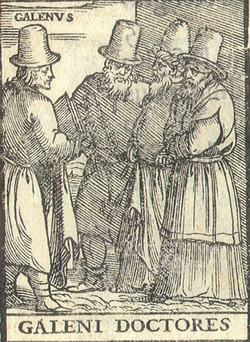 Venetian woodcut (1550)
Venetian woodcut (1550) "If it is a legitimate rape, the female body has ways to try and shut that whole thing down," I wondered which doctors he'd been speaking to.
The last time I’d heard such a theory was when reading early modern English social history books. I wasn’t the only one- Guardian blogger Vanessa Heggie traces the “legal position that pregnancy disproved a claim of rape” back to the 13th century. I remember being horrified when I first read that a 16th century rape victim had no case if she became pregnant.
In fact the medical theory on which this law was based is even older. As Corrine Saunders explains in her book Rape and Ravishment in the Literature of Medieval England:
“One widely circulated medical theory, based on the ideas of Galen, held that women as well as men emitted seed, and therefore that only when an emission was made, through orgasm, could conception occur: Failure of either partner to achieve orgasm rendered intercourse nonprocreative... According to the Galenic theory of conception, for pregnancy to occur as a result of rape was impossible...”
As Galen lived from 129 –c. 200 AD, we can see that these ideas have been in circulation since ancient times.
But even more disturbingly, Akin is not the only modern man to have espoused such ancient views regarding female biology, as Robert Mackey demonstrates in his latest blog for the New York Times.
I thought it was fascinating that the works of Galen could continue to have currency as late as the Tudor and Stuart period that I’ve studied. It’s even more surprising to see men dangerously innocent of modern biology today.
 RSS Feed
RSS Feed
